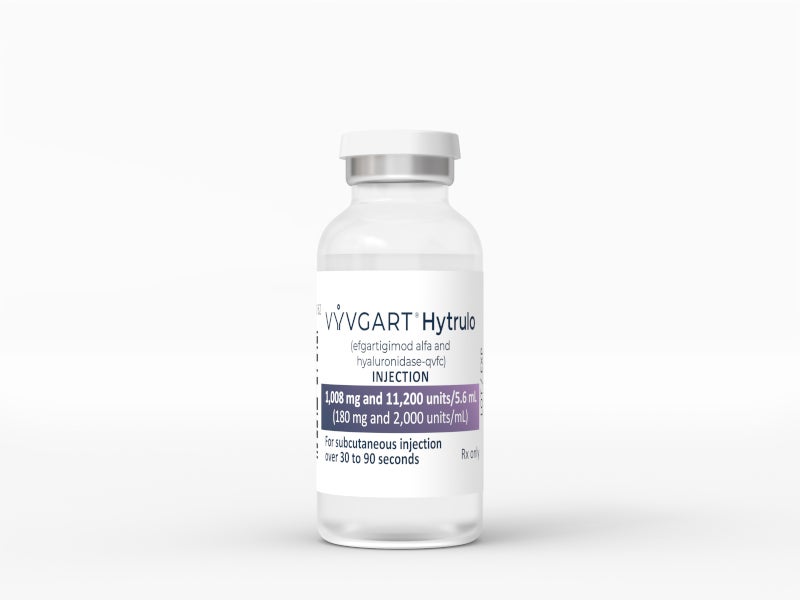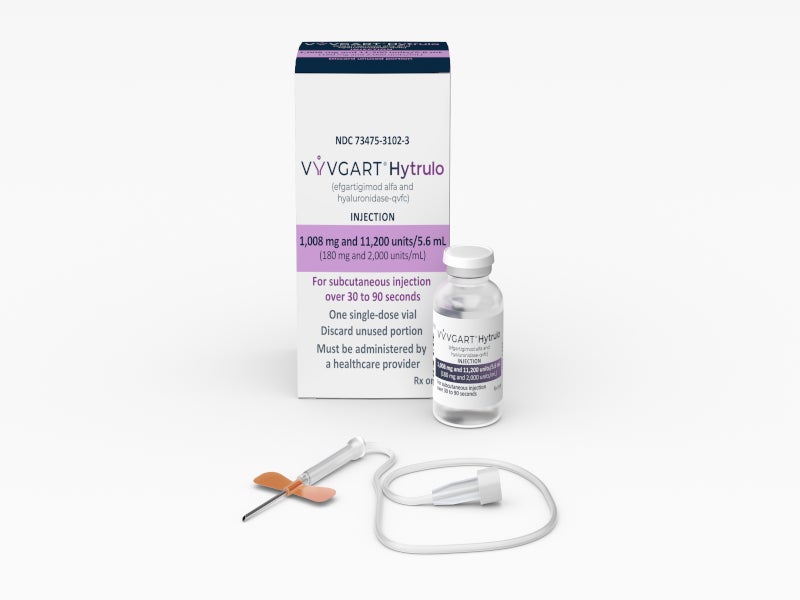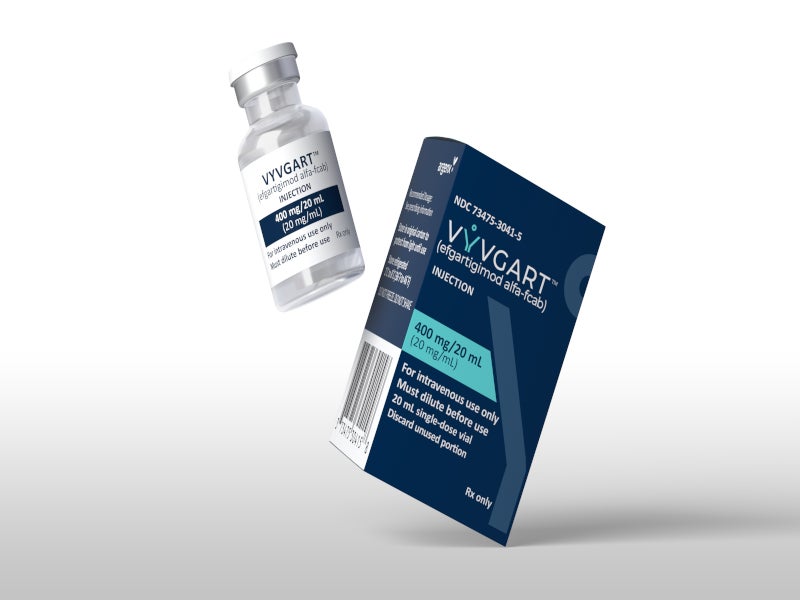VYVGART is a first-in-class neonatal Fc receptor (FcRn) antagonist approved to treat generalised myasthenia gravis in adult patients who have tested positive for anti-acetylcholine receptor (AChR) antibody.
VYVGART was developed by argenx, a biotechnology company based in the Netherlands. argenx collaborated with Zai Lab, a biopharmaceutical company based in China, to develop and market efgartigimod in China, including Mainland China, Hong Kong, Taiwan, and Macau in January 2021.
VYVGART is available as a yellowish, transparent to opalescent 400mg dosage strength solution in 20ml single-dose vial for intravenous (IV) use.
Regulatory approvals for VYVGART and VYVGART Hytrulo
VYVGART received US Food and Drug Administration (FDA) approval in December 2021, followed by approval in Japan and the European Union (EU) in January 2022 and August 2022, respectively.
In June 2023, China’s National Medical Products Administration (NMPA) approved the biologics licence application (BLA) for VYVGART as an add-on to standard therapy for the treatment of adult patients with generalised myasthenia gravis (gMG).
Zai Lab is working with the National Healthcare Security Administration (NHSA) to include the drug in National Reimbursement Drug List (NRDL) for broad access to patients.
Further, the FDA approved VYVGART Hytrulo (efgartigimod alfa and hyaluronidase-qvfc) subcutaneous (SC) injection for gMG in adult patients who are AChR antibody-positive in June 2023.
Marketing authorisation applications for the VYVGART Hytrulo SC injection are currently under review with the European Medicines Agency (EMA) and Japan’s Pharmaceuticals and Medical Devices Agency (PMDA). Approval decisions are expected by the end of 2023 and in the first quarter of 2024, respectively.
VYVGART Hytrulo details
VYVGART Hytrulo is a combination of VYVGART, a human IgG1 antibody fragment, and Halozyme’s ENHANZE® drug delivery technology, a recombinant version of the human hyaluronidase PH20 (rHuPH20) used to enable subcutaneous delivery of biologics.
It is available as 1,008mg of efgartigimod alfa and 11,200 units of hyaluronidase per 5.6ml (180mg/2,000 units per ml) in a single dose vial.
VYVGART Hytrulo was developed using Halozyme ENHANZE drug delivery technology for subcutaneous administration. It is administered as a single injection over 30 seconds to 90 seconds, in once-weekly injection cycles for four weeks, after which dosing is based on individual response, so physicians can tailor treatment based on their patient’s unique needs.
The administration method is expected to be easier and more convenient than the company’s previous IV formulation of efgartigimod alpha.
Generalised myasthenia gravis (gMG) causes and symptoms
gMG is a rare and chronic autoimmune disease, which causes potentially life-threatening muscle weakness in skeletal muscles connecting bones. Muscle weakness is due to disruption of communication between nerves and muscles caused by IgG autoantibodies.
Approximately 85% of MG patients progress to gMG within 24 months, affecting muscles throughout the body.
Common symptoms include ocular myasthenia, ptosis, blurred vision, facial expression changes, difficulty in swallowing, shortness of breath, impaired speech, and weakness in arms, hands, fingers, legs and neck.
VYVGART’s mechanism of action
VYVGART is a human IgG1 antibody fragment that binds to the FcRn and reduces circulating IgG antibodies.
VYVGART Hytrulo is a co-formulation of efgartigimod alfa and hyaluronidase-qvfc. The hyaluronidase is an endoglycosidase, which is used to improve the dispersion and absorption of co-administered drugs when given subcutaneously.
Clinical trials on VYVGART
The approval of VYVGART was based on the global, 26-week, multi-centre, randomised, double-blind, placebo-controlled Phase Ⅲ clinical trial named ADAPT.
A total of 167 patients were enrolled and randomised to receive either efgartigimod alfa fcab intravenous (EFG IV) 10mg/kg or placebo.
The trial met its primary endpoint, indicating that a significant 68% of anti-AChR antibody-positive gMG patients responded to efgartigimod therapy, compared to 30% of patients on placebo on the Myasthenia Gravis Activities of Daily Living (MG-ADL) scale during the first treatment cycle.
Furthermore, 63% of individuals showed a three-point decrease on Quantitative Myasthenia Gravis (QMG) scale after efgartigimod treatment compared to only 14% of individuals who received placebo. The drug showed a well-tolerated safety profile.
The study established the effectiveness of the drug to treat gMG in adults who are anti-AChR antibody-positive.
Headache, urinary tract infection, and respiratory tract infection were the most common adverse events reported in patients during the clinical trial.
Clinical trials on VYVGART Hytrulo
The approval of VYVGART Hytrulo was based on the Phase Ⅲ ADAPT-SC bridging study, which demonstrated a decrease in anti-AChR antibody levels comparable to VYVGART IV in adult gMG patients.
The study, involving 110 adult patients with gMG, assessed the non-inferiority of VYVGART Hytrulo’s pharmacodynamic effect compared to VYVGART in a multi-centre, randomised, open-label, parallel-group study.
Patients were randomised in a 1:1 ratio to receive SC efgartigimod or IV efgartigimod for one treatment cycle comprising four doses at weekly intervals. The total study spanned 12 weeks, which encompassed a period of seven weeks for follow-up after the treatment cycle.
The trial met the primary endpoint of non-inferiority with VYVGART Hytrulo showing a 66.4% mean total IgG reduction from baseline compared to 62.2% with VYVGART.
The most common side effects were injection site reactions (ISRs), which were mild to moderate in intensity and subsequently faded.
Other ongoing clinical trials on VYVGART Hytrulo
The long-term safety and tolerability of VYVGART Hytrulo are being studied in the Phase Ⅲ ADAPT-SC+ open-label extension trial. About 95% of patients who completed the ADAPT-SC trial chose to enrol in the open-label extension trial.
The results show a persistent symptom reduction for the condition with each treatment cycle, and no new safety issues were found.





